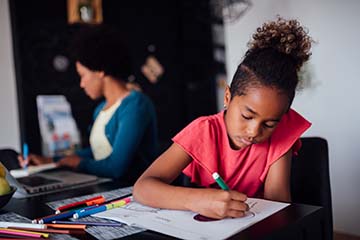School readiness

Making sure your child is ready for school is more than getting them accepted at a preschool or primary school at age 6 or 7. Age is only one of the factors that are involved in determining if your child is ready for school. Parents or guardians should prepare children in the following ways:
- Emotional: The child must have some ability to control their emotions and be reasonably independent, confident, and able to adapt to being separated from their current caregiver. Crying for the first few days or weeks when starting Grade R or Grade 1 is a common sign of adjusting. Physical: Your child should be able to do some physical activity such as running, walking, ball catching, etc. Prepare your child for school by teaching them how to hold and use pencils, cutlery, scissors, etc. They must also be able to use the bathroom unassisted.
- Social: This is about how your child interacts with others and their environment. They should be able to interact with other kids, exchange toys with them, and quickly join and fit in with a new group.
- Language development: This includes their vocabulary, speaking and listening skills. Your child must be able to have a conversation in their home language. They should be able to express themselves so that others can understand. Know basic numbers and letters, understanding the concept of time (before, after, day, night, etc.) and must be able to follow and remember the details of stories.
Your child’s readiness for Grade R and Grade 1 and their experience in their first year of school will lay the foundation for the rest of their time at school.
The Western Cape Education Department offers the following advice to parents for children from Grade R to Grade 6:
- Chat with your child about school – about friends, activities, teachers and assignments.
- Set goals – make sure they are achievable, and focus on achieving them one at a time.
- Praise your child for specific achievements – focus on their strengths and celebrate progress.
- Encourage your child if they fail a test – it’s a test, and your child isn’t a failure. Nurture and offer the right support, and they’ll make progress.
How to support your child with reading and writing
- Make reading to your child a daily habit.
- If your child can read, let them read to you daily.
- Your child must see you read for work, leisure (newspapers, magazines, books) or study purposes.
- Discuss the main characters, the plot, and their thoughts on the subject with them as they read. It is an effective way to discuss values with them and teach them valuable life lessons. Let them help you cook, and ask them to read the food labels and recipes.
- Read nursery rhymes and storybooks that are right for their age. Play a rhyming game with them.
- Let your child join a library and visit often. Help your child by looking for and choosing interesting books.
Let your child show you what they did in class when you ask them about it. Use this chance to exercise their reading, writing, and math skills.
How to support your child (Grade R to Grade 3) in numeracy
Here are some practical tips from WCED: 
Sort and count
- Let your child sort items in the house and tell you how they have grouped them, for example, clothing by colour or clothing type.
- Count to 100 objects; allow your child to group objects and count in 2s, 3s, 4s, 5s, 10s, etc. Partition 2, 3-digit numbers in different ways.
- Encourage your child to estimate, for example, tall, long, high, how many macaroni noodles you intend to cook for your macaroni cheese dish and count the macaroni to check.
- Encourage your child to help you while you cook or bake, as example, ask for ½ cup of flour etc.
- Do halving (start with sharing the sweets between 2 and then to more children).
- Let your child cut the sandwich into 2, 3 or 4 equal pieces.
Measurement and money
- Encourage your young child to use their hand or foot to measure distance etc. Later, use a ruler or tape measure to measure the lengths of objects, sides of shapes, circumferences of a ball or potato, etc.
- Allow your child to help sort items in the house, for example, heavy items on the bottom shelf and light items on the top shelf of the grocery cupboard.
- Allow your child to buy and pay for an item at the shop when you buy groceries or clothing. Make them check the change. Play shop at home with items you’ve priced. Let your child arrange the price of the items from the most expensive to the cheapest.
Time
- Ask your child to tell you the time during the day. Start with ‘on the hour’ then ‘half-hours’, then ‘quarter hours’ and lastly the minutes, for example, It’s twenty-six past five.
- Make your child aware of the length of time, for example, ask: What takes more time, walking or driving to school or eating supper?
Calculations while travelling
- Use your time while travelling; look at car registration plates. Let your child add the first 2 or last 3 numbers, they can subtract the smallest number from the biggest number.
Shapes
- Make your child aware of shapes in and out of the house, for example, squares, circles, rectangles, and triangles.
- Encourage your child to find patterns in nature, for example, leaves, flowers, windblown sand etc.
Games to play
- Encourage your child to play Monopoly, dominoes, snakes and ladders, ludo, card games like ‘Happy Families’ and Heads and Tails, skipping, hopscotch and traditional games involving counting.
In addition
You can also help your child and your teacher by
- ensuring your child arrives at school on time,
- ensuring your child obtains exercise books and any other relevant books in the first week of school,
- checking that your child has read, written and practised maths every day,
- ensure that your child has adequate exercise and sleep,
- checking your child's exercise books regularly,
- appreciating the importance of homework; although it shouldn't exceed 10 minutes a day in the first two terms of Grade 1 and 15 minutes in terms 3 and 4,
- discussing your child's progress with the teacher (Your school should provide you with an assessment plan at the beginning of the year and a formal progress report at the end of each term), and
- ensuring your child attends school every day for the 200 days of the school year.
Other information:


